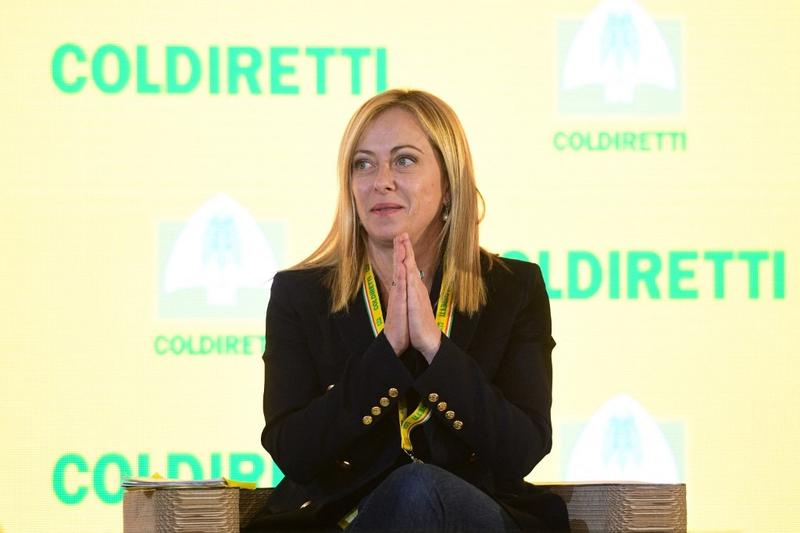Gains by populist parties show failures of establishment players, experts say
 Leader of Italian far-right party "Fratelli d'Italia" (Brothers of Italy), Giorgia Meloni reacts on Oct1, 2022 during a visit to the "Villagio Coldiretti" in Milan, a three-day event organized by the Italian Italian Farmers' Association. (PIERO CRUCIATTI / AFP)
Leader of Italian far-right party "Fratelli d'Italia" (Brothers of Italy), Giorgia Meloni reacts on Oct1, 2022 during a visit to the "Villagio Coldiretti" in Milan, a three-day event organized by the Italian Italian Farmers' Association. (PIERO CRUCIATTI / AFP)
The success of far-right parties in recent elections in Europe can largely be attributed to the lackluster performance of the established parties that have traditionally formed governments in the region, experts say.
In France, Marine Le Pen of the far-right National Rally party lost to incumbent President Emmanuel Macron in the presidential elections in April, but her party secured more than 10 times the seats in the June parliamentary election that it won five years ago
Giorgia Meloni, the leader of the Brothers of Italy party, led a right-wing coalition to gain 44 percent of the vote in a snap election on Sept 25. She is expected to become Italy's first female prime minister.
In a speech in Milan on Oct 1, she said that Rome will start putting national interests first.
"The attitude of Italy needs to return to defending its national interests," she said. "That doesn't mean a negative attitude to Europe but a positive attitude to ourselves."
ALSO READ: Austria seeks allies against EU green investment rules
In Sweden, the controversial far-right Sweden Democrats obtained 20.5 percent of the vote in a national election on Sept 11. They edged out the center-right Moderate party, traditionally the largest right-wing party, which gained 19.1 percent support.
In France, Marine Le Pen of the far-right National Rally party lost to incumbent President Emmanuel Macron in the presidential elections in April, but her party secured more than 10 times the seats in the June parliamentary election that it won five years ago.
Taken together, the electoral success of far-right parties, which are known for their anti-immigration views and skepticism toward the European Union, will pose a challenge to the bloc at a critical time.
Tomasz Michalski, associate professor of the Economic and Decision Sciences Department of HEC Paris, said that one main reason for the extreme right getting access to power in Europe is that the traditional parties have disintegrated over recent decades.
ALSO READ: Germany girds for gas supply pain, targets US$93b relief plan
He notes that parties on the far right rarely rule alone and need to seek coalition parties.
"Extreme right-wing parties are something that haven't been tried before, after successive governments, irrespective of the political colors, were seen as unable to deal with important social issues, such as deindustrialization, COVID-19 and inflation," Michalski said.
Yan Shaohua, an associate professor at the Institute of International Studies at Fudan University in Shanghai, said Meloni has benefited from the underperformance of previous governments and has seized on a call for change by many Italians in a turbulent era.
Uncertain future
Yan expressed the view that an election victory in a given country does not necessarily mean that right-wing populism will gain further momentum in Europe.
"They have probably identified the right problems in Europe, but their success will eventually depend on how they bring the right solutions," he said.
He said that the prospect of a far-right government in Rome is certainly not a comforting signal for Brussels.
"While Meloni claims to support European integration, she is expected to make more troubles than contributions to EU decision-making, challenging EU policies in areas of migration, economic governance and energy sanctions against Russia," Yan said.
Michalski said that far right-wing parties are typically nationalistic and anti-immigrant, seeking a stronger role for national governments while often opposing the influence of transnational bodies such as the European Commission.
But they do recognize the gains, to varying degrees, that come with membership of the EU.
"This rather means that national bargaining will be tougher, and more difficult to obtain negotiated solutions to common EU problems," he said.
ALSO READ: Europe Inc's wage hikes alarm investors as recession worries grow
European Commission President Ursula von der Leyen warned right before the Italian election that "if things go in a difficult direction, I've spoken about Hungary and Poland, we have tools". The harsh words drew criticism from politicians in Italy and several other EU member states.
Rosa Balfour, director of Carnegie Europe, wrote on the think tank's website that within the EU, Meloni has two possible paths.
"The first is to try to gain some legitimacy in Europe and work constructively with partners," she wrote. "The alternative path would be far more confrontational. Meloni may choose to invest in her party's political allies and like-minded partners in Europe, such as the governments of Poland and Hungary."
On Italy's relations with China, Yan said that the foreign policy debates in Italy were not very balanced when it came to China.
"Meloni's stance on China seems to be informed a lot by the Russia-Ukraine conflict, leading her to put China and Russia in the same basket, which is not in line with the reality," he said. "When she comes into power, she might take a more balanced approach toward China than what she has indicated."



